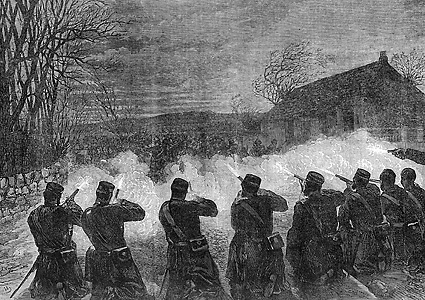Nationalism refers to a people’s sense of common belonging and loyalty to a nation. Nationalism may arise among people who share such common traits as culture, language, origin, and tradition. It may develop as people join to form a unified government. Nationalism may also originate as people fight to establish a unique racial, cultural, or religious identity. A peoples’ struggle to prevent their identity from being changed or erased by a more powerful group might also spur a feeling of nationalism. In each situation, nationalism creates a sense of connection and commitment to a group with a distinct set of beliefs, ideals, and traditions.
Although nationalism is widespread today, it once did not exist. Early people felt that they belonged to cities, families, or tribes. As a result, people’s loyalty and attachment were much more local. As people expanded their view of the world, they began to spread their loyalties among several groups. For example, in 1400, people living in what is today modern France might have vowed loyalty to the duke of Burgundy, the king of France, the Holy Roman emperor, and the pope.
The rise of nationalism
can be traced to the development of a political unit known as the nation-state. A nation-state has three characteristics. A nation-state’s people share some or all of such common traits as culture, history, language, and religion. Its people experience a feeling of unity. Its people inhabit a specific area of land with its own independent government.
Nationalism is important in maintaining nation-states. The principles of nationalism are often referred to as the doctrine of national self-determination. According to these principles, the nation is the only rightful basis for forming a political state. In this sense, nationalism argues that all human activity is national in character. Those living in a nation are expected to adopt the national language, embrace the nation’s symbols, learn and pass on the national music and folklore, and defend the nation’s principles.
Nation-states began to develop sometime around 1300 to 1400. In this period, people’s sense of place changed. Travel and communication had improved. People became increasingly aware of the parts of a country that lay beyond their immediate community. As a result, loyalty to local and religious leaders weakened. Allegiance to a monarch grew stronger. By the 1700’s, these factors enabled such European countries as England, France, and Spain to become nation-states. In the 1800’s, additional nation-states, such as Germany and Italy, formed as the result of unification movements. In such cases, several provinces or states combined into a single political unit.
In the 1800’s and 1900’s, many nation-states also formed as a result of independence movements. Nationalist groups sought to break away from large empires and create smaller states. Argentina won independence from the Spanish Empire in 1816. Greece won independence from the Ottoman Empire in 1829 and India from the British Empire in 1947. In the early 1990’s, nationalism contributed to the breakup of several states in Eastern Europe, including Czechoslovakia, the Soviet Union, and Yugoslavia.

Smaller nationalist groups continue to struggle for the establishment of their own independent nation-state. These movements often are based on a desire for ethnic or religious separatism. In 1980, for example, people in the Basque provinces of Spain elected a regional parliament. The region, known as Basque Country, has limited self-government. However, some of the people in the region are striving for full independence for the Basque Country.
The effects of nationalism
can be both good and bad. Nationalism gives people a sense of belonging and pride. It provides a cultural heritage and a common cultural ground. Nationalism also creates a willingness in people to make sacrifices for their country. During a time of war or other crisis, nationalism may provide a people with a sense of purpose that allows them to survive hardship.
But nationalism also produces rivalry and tension between nations. When nationalist groups within a region want independence from the nation, fighting often occurs. Likewise, when nation-states try to extend their influence beyond their physical borders, military conflict often occurs. Historians commonly list national independence movements as a primary cause of World War I (1914-1918). Feelings of nationalistic superiority have at times led nations to commit genocide, the deliberate and systematic mistreatment or extermination of an entire people. For example, Nazi Germany murdered millions of Jews during World War II (1939-1945) because of the Nazi belief that Germans were superior to Jews.
Nationalism also can be improperly used for the political gain of a specific person or party. In the early 1950’s, United States Senator Joseph McCarthy used nationalism as a cover for falsely accusing officials in the U.S. government of cooperating with Communists. Such dictators as Adolf Hitler of Germany, Benito Mussolini of Italy, and Augusto Pinochet Ugarte of Chile used nationalism in demanding extreme loyalty from their people.
